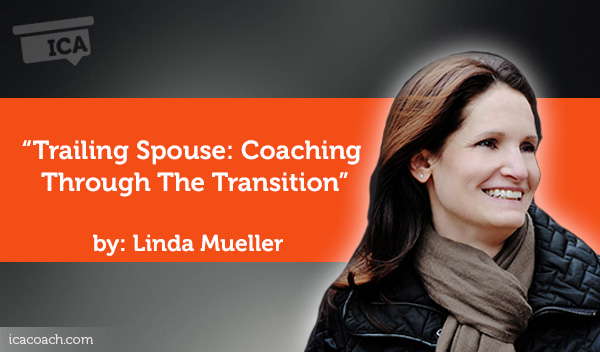
Research Paper By Linda Mueller
(Expat Spouse Coach, JAPAN)
Introduction
Trailing spouses are typical, although this is becoming less gender-specific over time, the wives of corporate employees are temporarily assigned to work abroad. From the outside, this group appears to live a privileged life – from a cost-of-living allowance that covers a variety of domestic help, exotic vacations, and private schooling for the kids to the opportunity to reinvent oneself as an adult. Nonetheless, the challenges associated with such an existence out-weigh the benefits for some; often resulting in the employee’s failure to succeed in his assignment. As the expense of supporting an expat employee is great, often exceeding US$1 million per assignee per assignment (McNulty, 2005), such failure often damages the employee’s career and creates a large financial burden on the corporation. Coaching provides the support the wife of an expat needs to successfully transition to her role as a trailing spouse – creating a positive and productive experience for herself and her loved ones – and should be included in the expat benefits package to increase the likelihood of the assignee’s success.
Note:
The focus of this paper is on female trailing spouses who are mothers and were employed in their home country but are not able to continue their previous careers once moving abroad. This description covers the majority of trailing spouses currently living abroad.
Challenges Faced
While some trailing spouses very willingly leave life in their home country behind to move abroad, many are not given a true choice in the matter if their husband wants to maintain his career. There is a full range of situations, emotions, and concerns experienced by the wife, which make the specific circumstances of every trailing spouse unique.
Trailing Spouse Challenges:
Below is a listing of key categories of challenges faced by a majority of trailing spouses. Please note that there are a variety of other issues that arise for individuals ranging from health issues of those on assignment, as well as extended family members at home, to infidelity, and so on. While these issues are equally as difficult, if not more so, they are not quite as widespread as those in the categories below.
Identity Crisis v. Identity (Re)definition
Looking at the largest internal (fear, uncertainty, and underlying beliefs) and external (major life changes, environment, social, workplace, family, unpredictable events) life stressors one can face, according to the Mayo Clinic (2012), it is apparent that a move abroad is likely to include most and perhaps all of these. At the core of this stress for the trailing spouse is her loss of identity. In her home country, she knew who she was or at least operated on auto-pilot and did not have to think about it. Abroad, all that she knew is taken away (most likely no job/income, identity automatically attached to a husband and his company or her children and their school, and so forth) and she is faced with a great deal of free time during which to ponder who she is and what she should be.
There is a great deal of change going on in her life, much of which she can influence but not control. The one issue she can control is how she reacts to her situation and how she chooses to define herself – who she is and how she wants to be seen. On auto-pilot, this may lead to an identity crisis that will resound throughout the various aspects of her life. With coaching support, this can become a very positive opportunity to redefine herself with the knowledge, experience, and confidence she has built up in life.
There are many ways to support the trailing spouse from cultural consultants to new-arrival orientations to psychological help in extreme cases. Coaching is the one tool that is forward-focused, action-oriented, and focused specifically on the individual – supporting and teaching her to be accountable for who she is and how she acts. The cost of coaching is on par with if not below, that of the other support options.
Given the role that the spouse plays in supporting her family and serving as a corporate envoy, it would serve corporations well to provide spousal support in the form of coaching to increase the likelihood that the assignee will succeed and help the spouse turn a potential identity crisis into an opportunity to redefine her identity. This is not to say that some companies do not already consider the trailing spouse’s experience. Some generous or profitable companies do provide a stipend for self-improvement or pay for club memberships and the like, but the number of companies doing so in the world of declining sales and budget cuts has decreased.
Coaching through the (Re)definition
What a coach can offer:
Conclusion
A well-trained and experienced coach can help a trailing spouse believe that she can live her new life positively and productively that she finds personally fulfilling despite the challenges faced. The coach can offer not only to support by creating an honest, safe, and non-judgmental space but also to refer the trailing spouse to other professionals if needed. At the expense of a failed assignment, there is justification for the host company to provide a stipend to the wife to pay the relatively minimal expense of coaching fees. If the trailing spouse has a positive experience, the likelihood of the expat employee succeeding is greatly improved.
References
Chalre Associates (2012). Reasons for Expat Failure. Retrieved on April 30, 2012, from http://www.chalre.com/hiring_managers/reasons_expat_failure.htm
Macionis, John, and Linda Gerber. (2010). Sociology (7th edition). Toronto: Pearson Canada Inc.
Mayo Clinic Staff (2012). Stress Management: Identify Your Sources of Stress. Retrieved on April 30, 2012, from http://www.mayoclinic.com/health/stress-management/SR00031
McNulty, Yvonne. (2005). The Trailing Spouse Survey 2005. Australia: Monash University.
Permits Foundation. (2008). Expatriate Spouses & Partners Employment, Work Permits & International Mobility. The Hague: Permits Foundation.